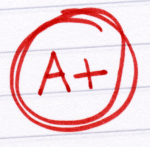PHIL 201 quiz 2 complete solutions correct answers key
- From Philosophy, General Philosophy

- Ultrahydralisk
- Rating : 97
- Grade : A+
- Questions : 0
- Solutions : 382
- Blog : 0
- Earned : $48769.64

Liberty University PHIL 201 quiz 2 complete solutions correct answers key
More than 5 versions
Question 1 It is possible for an argument to be valid and all the premises to be false.
Question 2 A onetoone comparison between two or more things is:
Question 3 We know that the laws of logic are selfevident and undeniable because
Question 4 In a valid deductive argument the conclusion follows necessarily from the premises.
Question 5 The Latin phrase that means ‘it does not follow’ is:
Question 6 This may be the most wellknown fallacy of presumption:
Question 7 Identify the fallacy: He's the third student I've caught cheating on the test. It just proves that you can't trust students these days.
Question 8 The “fallacy of hypostatization” treats an abstract word like a concrete word.
Question 9 The red herring fallacy:
Question 10 The fallacy that applies a double standard without warrant is called:
Question 11 A positive/negative approach is the weakest approach to take in presenting an argument.
Question 12 The term for beliefs relating together in a way that is mutually supportive:
Question 13 The explanation that can be understood with the least amount of effort, vagueness, and ambiguity has the best:
Question 14 The principle of simplicity says we should try to simplify complex arguments.
Question 15 One factor that strengthens a causal argument:
Question 16 An inductive argument is measured in degrees of probability:
Question 17 A sound deductive argument could be invalid.
Question 18 In a deductive syllogism, if the premises are true and the conclusion is true, then the argument is valid.
Question 19 Type of argument that begins with a problem with an unknown explanation, forms a theory and tests the theory.
Question 20 Identify this kind of argument: If naturalism is true, then all things are determined and there is no free will. If there is no free will then morality makes no sense. Therefore, if naturalism is true then morality makes no sense.
Question 1 The most common form of inductive reasoning is:
Question 2 The first and perhaps most primary law of logic is:
Question 3 A onetoone comparison between two or more things is:
Question 4 The “if” part of a hypothetical proposition is called the:
Question 5 The Latin phrase that means ‘it does not follow’ is:
Question 6 Identify the fallacy: He's the third student I've caught cheating on the test. It just proves that you can't trust students these days.
Question 7 One should avoid using emotional language in an argument as it usually distorts and misleads the argument.
Question 8 The fallacy of equivocation occurs when the meaning of a significant term changes in the middle of an argument.
Question 9 This fallacy is sometimes referred to as the false dilemma:
Question 10 If a fallacy doesn’t break a formal rule, but there is still something wrong with the reasoning, it is called:
Question 11 The principle of simplicity says we should try to simplify complex arguments.
Question 12 The two great enemies of good arguments are:
Question 13 Plausibility is the aspect of a best explanation approach that
Question 14 Knowing the main point of the argument will help me find the conclusion.
Question 15 A positive/negative approach is the weakest approach to take in presenting an argument.
Question 16 Type of argument that begins with a problem with an unknown explanation, forms a theory and tests the theory.
Question 17 In a deductive syllogism, if the premises are true and the conclusion is true, then the argument is valid.
Question 18 An inductive argument is measured in degrees of probability:
Question 19 An analogy is an inductive argument.
Question 20 An inference drawn from statistical reasoning is deductive.
Question 1 The “if” part of a hypothetical proposition is called the:
Question 2 In a valid deductive argument the conclusion follows necessarily from the premises.
Question 3 The law of excluded middle states
Question 4 If an argument is sound, it means
Question 5 The Latin phrase that means ‘it does not follow’ is:
Question 6 The red herring fallacy:
Question 7 A fallacy of relevance:
Question 8 The fallacy of equivocation occurs when the meaning of a significant term changes in the middle of an argument.
Question 9 The fallacy that applies a double standard without warrant is called:
Question 10 One should avoid using emotional language in an argument as it usually distorts and misleads the argument.
Question 11 The two great enemies of good arguments are:
Question 12 One way to defeat an argument using an example is to respond with a counterexample.
Question 13 The term that refers to a set of beliefs in which none of them contradicts the others:
Question 14 A best explanation approach is often the best way to argue because many issues in philosophy do not have perfect solutions.
Question 15 The principle of simplicity says we should try to simplify complex arguments.
Question 16 Type of argument that begins with a problem with an unknown explanation, forms a theory and tests the theory.
Question 17 An argument where one gathers identical particular instances and arrives at a common conclusion:
Question 18 An argument may be evaluated as “true” or “false.”
Question 19 Invalid deductive arguments are the same as inductive arguments.
Question 20 An inductive argument is measured in degrees of probability:
Question 1
We know that the laws of logic are self‑evident and undeniable because
Question 2
If an argument is sound, it means
Question 3
In a valid deductive argument the conclusion follows necessarily from the premises.
Question 4
The first and perhaps most primary law of logic is:
Question 5
According to the reading, even God cannot create a contradiction.
Question 6
The “fallacy of hypostatization” treats an abstract word like a concrete word .
Question 7
This fallacy occurs when an argument is distorted to an extreme and becomes a false
imitation of the original argument:
Question 8
This fallacy is sometimes referred to as the false dilemma:
Question 9
Identify the fallacy: Senator Newkirk’s arguments to increase federal spending for the
military should be rejected. He is only arguing because he has several military bases
in his state and is beginning his re‑election campaign.
Question 10
This fallacy claims that if a position is popular then it must be right:
Question 11
Explanatory Scope refers to :
Question 12
Which of the following should we do first in our analysis of an argument's validity?
Question 13
In the best explanation approach, illumination
Question 14
One factor that strengthens a causal argument:
Question 15
The term that refers to a set of beliefs in which none of them contradicts the others
Question 16
A sound deductive argument could be invalid.
Question 17
An analogy is an inductive argument.
Question 18
If you have enough evidence you can be logically certain of a conclusion arrived at
inductively.
Question 19
Invalid deductive arguments are the same as inductive arguments .
Question 20
The formal procedure for writing out a deductive argument is called
Question 1 The most common form of inductive reasoning is:
Question 2 A onetoone comparison between two or more things is:
Question 3 It is possible for an argument to be valid and all the premises to be false.
Question 4 A mixed hypothetical syllogism in which the premise denies the consequent is called:
Question 5 The Latin phrase that means ‘it does not follow’ is:
Question 6 Identify the fallacy: He's the third student I've caught cheating on the test. It just proves that you can't trust students these days.
Question 7 “Begging the question” is a fallacy of presumption.
Question 8 Slippery slope and straw man are really doing the same thing, just in a different order.
Question 9 The “fallacy of hypostatization” treats an abstract word like a concrete word.
Question 10 The fallacy that applies a double standard without warrant is called:
Question 11 One way to resolve the problem of conflicting authorities is to:
Question 12 The two great enemies of good arguments are:
Question 13 Plausibility is the aspect of a best explanation approach that
Question 14 The principle of simplicity says we should try to simplify complex arguments.
Question 15 Which of the following should we do first in our analysis of the ‘validity’ of an argument?
Question 16 An analogy is an inductive argument.
Question 17 Invalid deductive arguments are the same as inductive arguments.
Question 18 An argument where one gathers identical particular instances and arrives at a common conclusion:
Question 19 The formal procedure for writing out a deductive argument is called
Question 20 Identify this kind of argument: If naturalism is true, then all things are determined and there is no free will. If there is no free will then morality makes no sense. Therefore, if naturalism is true then morality makes no sense.
[Solved] PHIL 201 quiz 2 complete solutions correct answers key
- This Solution has been Purchased 9 time
- Submitted On 13 May, 2016 08:59:14

- Ultrahydralisk
- Rating : 97
- Grade : A+
- Questions : 0
- Solutions : 382
- Blog : 0
- Earned : $48769.64


PHIL 201 Quiz 8 Liberty University | Complete Solution

PHIL 201 Quiz 7 Liberty University | Complete Solution

Liberty University PHIL 201 Discussion Board Forum 2 thread paper writing solution

PHIL 201-D40 Liberty University

Liberty University PHIL 201 quiz 8 complete solutions correct answers A+ work
The benefits of buying study notes from CourseMerits

Assurance Of Timely Delivery
We value your patience, and to ensure you always receive your homework help within the promised time, our dedicated team of tutors begins their work as soon as the request arrives.
Best Price In The Market
All the services that are available on our page cost only a nominal amount of money. In fact, the prices are lower than the industry standards. You can always expect value for money from us.


